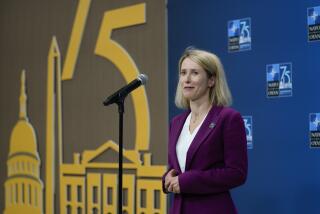Roots Across Sea : Irvine Professor Elected to Estonian Congress
- Share via
IRVINE — Rein Taagepera, newly elected member of Estonia’s congress, ran his campaign from the kitchen of his Irvine home.
He pounded out essays and speeches on a home computer, then broadcast them to his homeland in the Soviet Union via Radio Free Europe. Sometimes he faxed his campaign literature to Estonia and counted on friends to distribute it to voters.
“Of course when you try to send a fax to Estonia, it sometimes takes three to four days. There’s a lot of hit and miss,” Taagepera said.
Born in Estonia, Taagepera, 57, is a UC Irvine political science professor whose articles and speeches brim with pro-independence rhetoric about his homeland’s struggle with the Soviet Union. He is a staunch nationalist who, at the age of 11, accompanied his parents as they fled Estonia after the Russian occupation in 1944.
Taagepera, who is a Canadian citizen, is the only person in the United States who was elected in March to the new, 500-member Estonian Congress. In all, four of those elected live outside Estonia.
In Estonia, Taagepera explained, the congress is “like a national assembly. It is legal but has no administering power. The Supreme Soviets (the ruling authority) still run the country.”
But he quickly adds: “However, everything in my homeland--control of the press, industry and government--is in a state of flux.”
Estonia, Latvia and Lithuania are the three Baltic states that were annexed by the Soviet Union in 1940. Only last week, Latvia joined Lithuania in declaring its independence. In the case of Lithuania, the action prompted Soviet President Mikhail S. Gorbachev to impose an economic blockade.
By contrast, Estonian leaders, seeking a more moderate approach and worried about the large numbers of Soviet troops within their borders, took a different tack. They tried to soften their stand with an “announcement” that the Soviet occupation was illegal and, therefore, Soviet laws no longer had authority.
The Estonian plan is to negotiate an independence agreement with Moscow that would remove Soviet troops from Estonian soil and hand control of the republic’s affairs to local officials, Taagepera said.
“Basically, we declared independence without using the word independence,” Taagepera said.
Since the announcement was made in March, Taagepera said, Soviet leaders in Moscow have asked Estonia to withdraw the statement.
Taagepera was one of 11 candidates vying for five seats in his hometown of Tartu. He won a seat with 4,346 votes, more than twice as many as his nearest competitor.
“I tried to go to Estonia for the election, but my visa was denied,” he said.
Cesar Sereseres, a UC Irvine colleague in the political science department, describes Taagepera as a caring man.
“He cares about his homeland, his students and his family. . . . He’s like professors from Ireland, Africa and Costa Rica who have blood roots to their homeland. These people have their ethnicity deeply embedded, not only in their brains but their hearts, and that’s Rein,” Sereseres said.
Taagepera’s wife, Mare, a UC Irvine chemistry instructor, was also born in Estonia. She said it is difficult for others to understand, but “our cultural background is very strong. We speak Estonian. . . . It’s a hard thing to explain to people not in this situation.”
To live under Soviet rule, she said, is to live with fear. Just several years ago, she said, people wouldn’t talk to their neighbors for fear of being reported to the KGB. “Estonians remember what it was like when it was independent, but the Russians came in and made us a third-world country.”
Taagepera has made trips to Estonia. On one visit last year, he made 21 public appearances in 18 days and spoke to crowds ranging from a handful of people to 5,000, he said. In his articles, Taagepera describes the Soviets as “post-occupation colonists,” essentially illegal immigrants who should apply for Estonian citizenship.
“It’s not only my viewpoint but a question of legality. The question isn’t to throw out a (Soviet colonist) who has been there 39 years, but to legalize their status,” he said.
“It’s not a matter of Estonia leaving the Soviet Union, because we never joined. We were illegally occupied, and that occupation has continued because of fraudulent elections. Our question is, ‘Do you want to join with the Soviet Union?’ Not, ‘Do you want to leave?’ ” he said.
Taagepera considers himself “more radical” than some of the mainstream pro-democracy organizers. But he believes that with relations presently strained between Moscow and the Baltic states, it would be foolish to begin pushing hard for Estonian independence right now.
He said he is seeking approval for a four-month teaching assignment at an Estonian university in Tartu. He views the assignment as a challenge to discover whether he would eventually like to move back to Estonia.
“I like living here and to live in Estonia would be a difficult move for both my wife and I. How do I know whether I would like living there? But let’s just say I’m considering moving back.”
More to Read
Sign up for Essential California
The most important California stories and recommendations in your inbox every morning.
You may occasionally receive promotional content from the Los Angeles Times.













